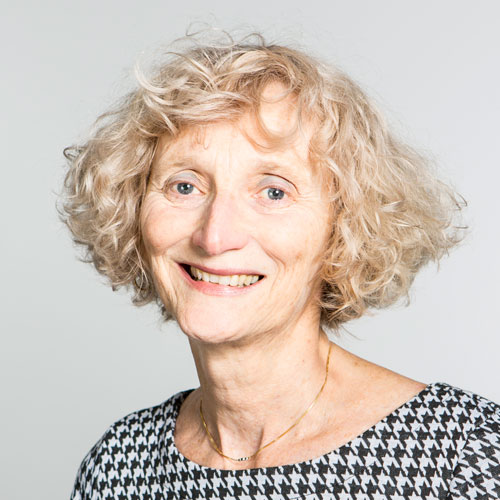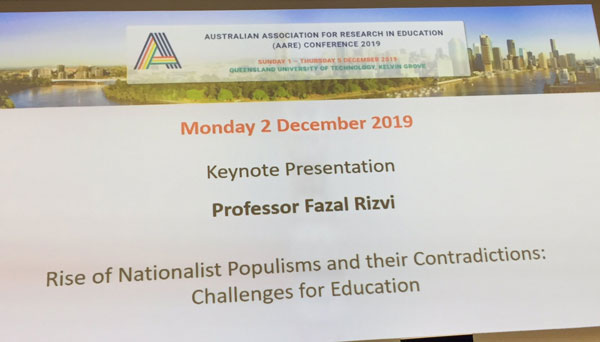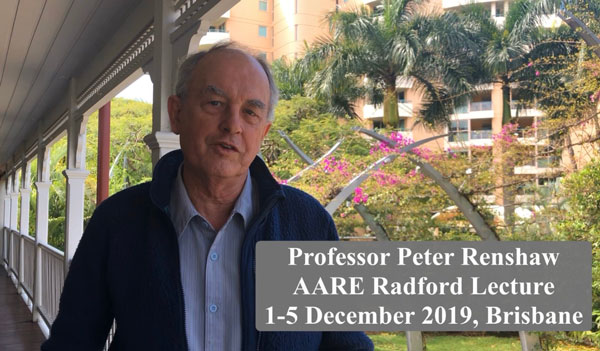
Education for a socially just world - the AARE Conference, Brisbane

Professor Ann Harris
HudCRES
In December 2019, with the generous support of the Journal of Vocational Education and Training, I was pleased to represent both JVET and HudCRES at the Australian Association for Research in Education (AARE) conference at the Queensland University of Technology in Brisbane. The theme of the conference was 'Education for a Socially Just World'.
Australia has always been an interesting and intriguing place: with its First Peoples’ and colonial history; its diverse ecosystem; and its exotic birds and animals. The sight of a king parrot or cockatoo flying overhead, or platypus in a river (no wonder they thought the creature was fabricated), inevitably fills one with awe, and that is without wondering why the country is home to so many venomous snakes (several of the deadliest make their home there).
AARE is a large conference with over 1200 delegates
Inevitably, although everyone is friendly, because of its size it can be quite difficult for a first time delegate. However, such conditions incentivise conversations with strangers, and I met a wide range of people. Connectivity seems to be established primarily through special interest groups (SIGs), but there didn’t seem to be a comprehensive delegate list (at least I never found one), which is a shame, because it would have facilitated networking. The attendance, however, is international, and I met people from the USA, Canada, the Middle East, China, Japan, India and South Africa as well as, of course, lots of Australians and a few Brits.
The theme of the conference was 'Education for a Socially Just World'. There was a really diverse programme with strands including: language and literacy; teacher education and research innovation; social justice; professional and higher education; aboriginal and Torres islander research; educational theory and philosophy; history and education; sociocultural activity theory; middle years’ schooling; politics and policy in education; inclusive education; sociology of education, health and physical education; educational leadership; technology and education; arts education practice research; motivation and learning; schools and education systems; early childhood; assessment and measurement; science, technology, engineering and mathematics; environmental and sustainability education; gender, sexualities and cultural studies; post-structural theory; qualitative research methodologies and rural education.
The biggest problem was what to choose ...
... and where to go (the latter proving more challenging than one might expect since QUT identifies its buildings alphabetically, but with letters being assigned as they were constructed (hence W is between A and B, and R is between D and E). Even trying to identify relevant options from the programme was somewhat exhausting in the Queensland summer heat, and, guiltily, I found myself seeking air conditioning for my contemplation. Still, I did manage to identify papers of particular interest (while no doubt missing out on many others) across various strands including professional and higher education (in which my paper was located), language and literacy, sociology of education, and gender, sexualities and cultural studies, ensuring I had lots to think about during and subsequent to the conference.
Nowadays, every official event in Australia starts with an acknowledgment of ‘the traditional owners of the land, past, present and emerging...'. There is, of course, a particular poignancy in these words given Australia’s colonial history (watch the film The Nightingale 2018, if you need to be reminded, albeit graphically, of what that means), and Captain Cook’s designation in 1770 of Australia as ‘terra nullius’. In the AARE context, I particularly like the inclusion of ‘emerging’ since education is all about developing and emerging.
The first keynote address was from Professor Fizal Rizvi of the University of Melbourne, entitled, The Rise of Nationalist Populisms and their Contradictions and Challenges for Education. Its focus was primarily a comparison between India and the USA, with additional examples from Australia, and even the UK being occasionally mentioned. It provided a stimulating start to the conference precisely because it addressed the big issues, engaging with political and social contradictions within the discourse of polarisation, and how notions such as democracy, globalisation, multiculturalism and the elite have been reconceptualised in the current context of neoliberalism and populism, the mediatisation of politics and the agenda of the alt right. Sadly, no easy solutions were offered except an enduring belief in education, and an imperative to consider what might be termed the affective and emotional, alongside ‘facts’ and values in order to theorise how they ‘speak’ to each other.

The final keynote speaker was Professor Peter Renshaw, from the University of Queensland. His address was a passionate call to arms for scholar warriors, facing the challenges of the Anthropocene, and he drew on a range of images and sources to exemplify his thesis. His aim was to tell place stories that situated education as both part of the conundrum and part of the solution, while reinforcing the message that education is activism, and activism is education. He reasoned that the ideology, which produced this moment, is not the way forward, and that what we now need is a move away from evidence-based practice to a pedagogy for enhancement. He argued for living justice and new forms of activism, and for spaces within the curriculum for student-led action. I loved the passion and didn’t need to be persuaded by the rhetoric, especially in a country which was burning. I’m all for a pedagogy for enhancement alongside a critical and cultural pedagogy.

The other sessions I attended were both interesting and informative. They included perspectives on the reform of VET; graduate identities and workplace ideologies; inclusion and exclusion and institutional stratification; professional learning and internships; assessment for social justice; global contexts in education; interculturalism and intercultural competence; culturally responsive pedagogies; teachers’ subjectivities; transformative teacher education; blended learning in EFL; feminist ethics; critical literacy education, academic reading as social practice. Each and every one of them stimulated thought and discussion, ideas and emotions.
The fires in Australia
My trip to Australia was coloured, literally, by fire, and the knowledge that we were at an academic conference while so much of the country was burning. There were many conversations about climate change and the environment. Fortunately for us, however, all that was alight in at the AARE conference in Brisbane was the passion and enthusiasm of academic and professional debate.
My experience of the fire, however, was not just academic. The personal impact was made very clear to me when, after the conference, having travelled south from Brisbane through mile after mile of burnt forest, I was visiting in northern New South Wales. Here I was engaged in fire hazard reduction which comprised creating fire breaks, clearing organic ground debris and positioning strategic sprinklers around a traditional, wooden Federation house with a tin roof and veranda. Each day, not just the temperature, but also the wind direction and strength preoccupied us. Living in the Australian bush in what is normally a beautiful sub-tropical valley should be idyllic, but there is only one way out, and the adjacent valley was burning.
These photos were taken on the same day and time, but looking in different directions: one is the sunset; the other is fire. Currently, I am glad to say that property and people are still safe . . . for the time being . . . but as Peter Renshaw emphasised, we must look to the future, listen, learn and educate.
